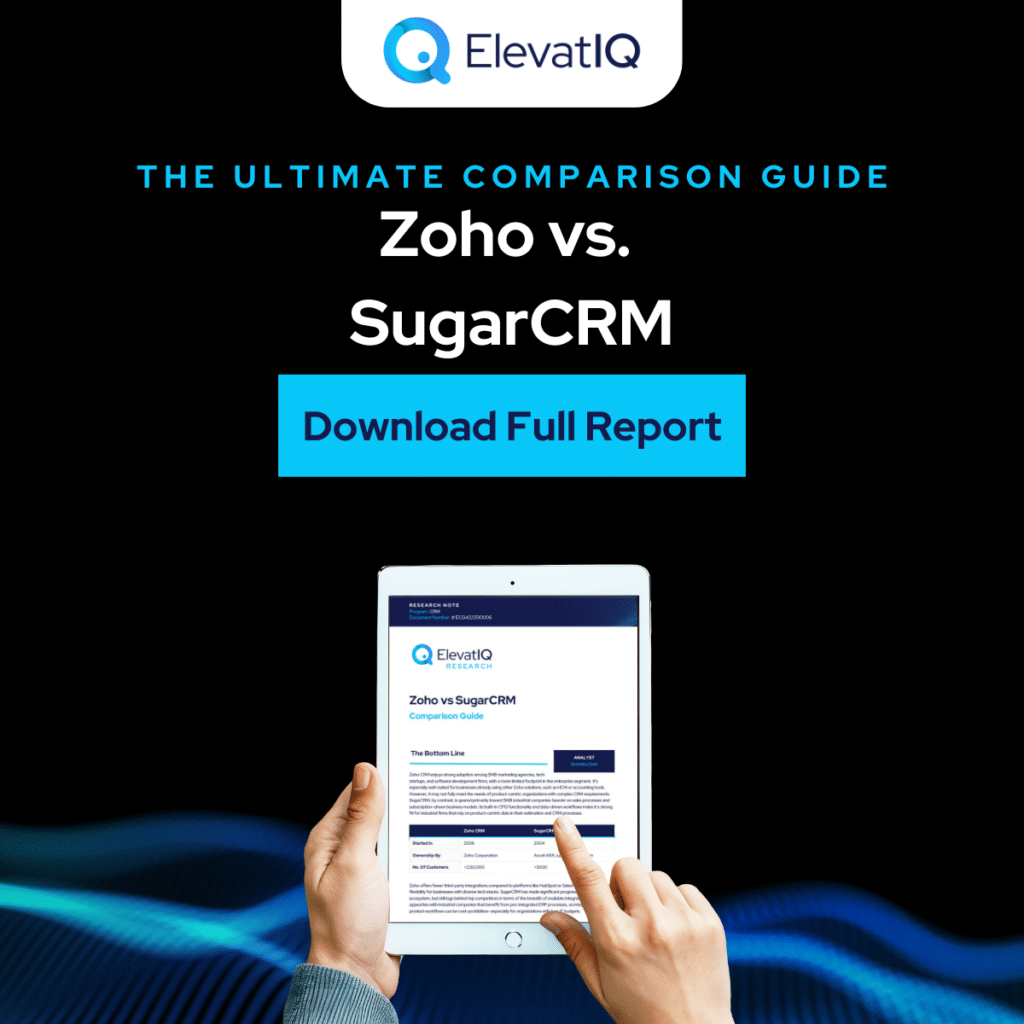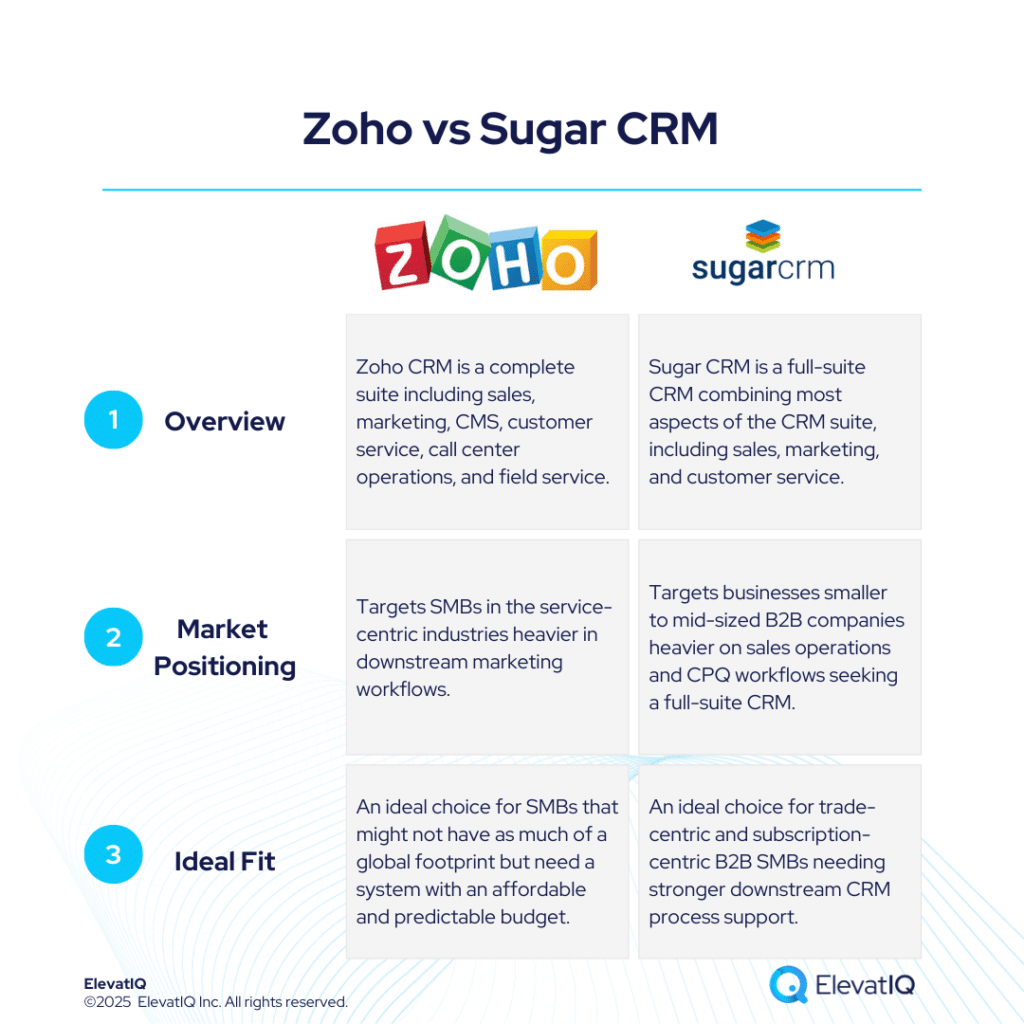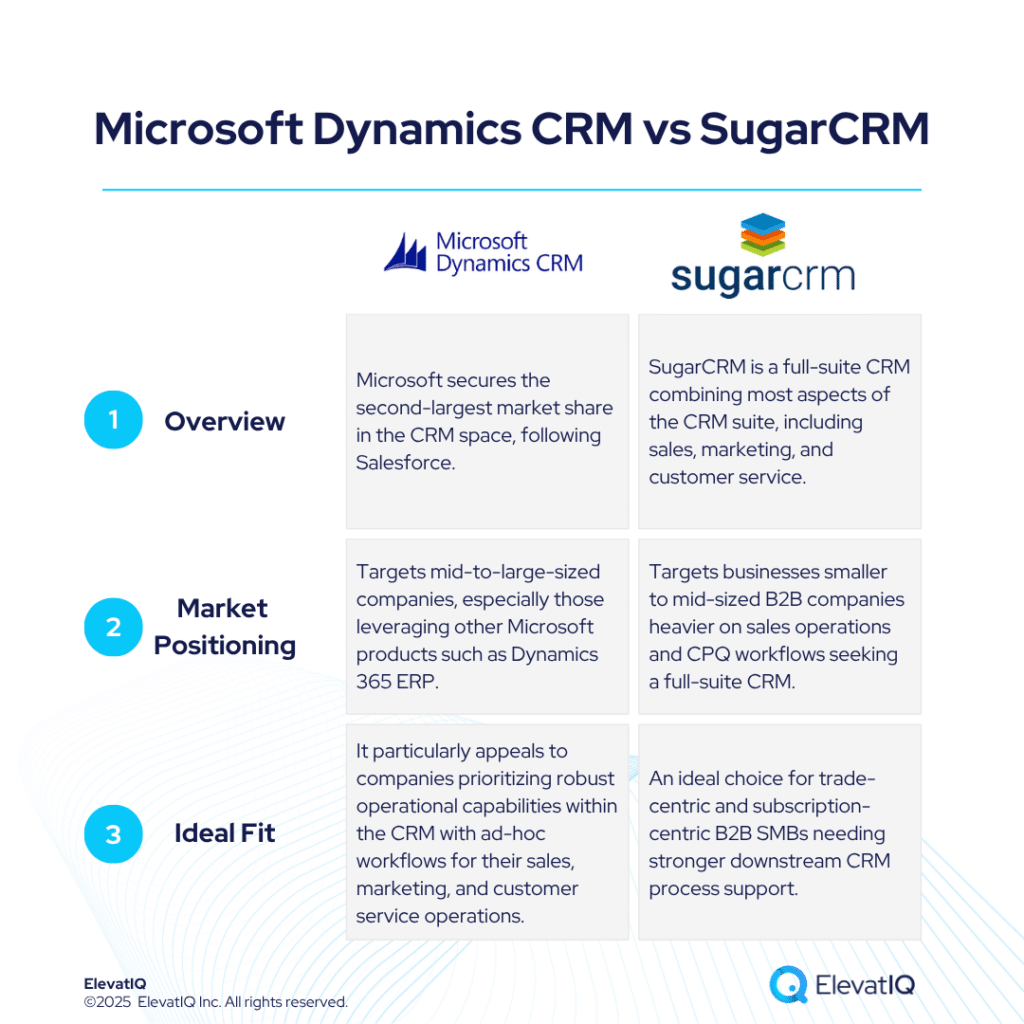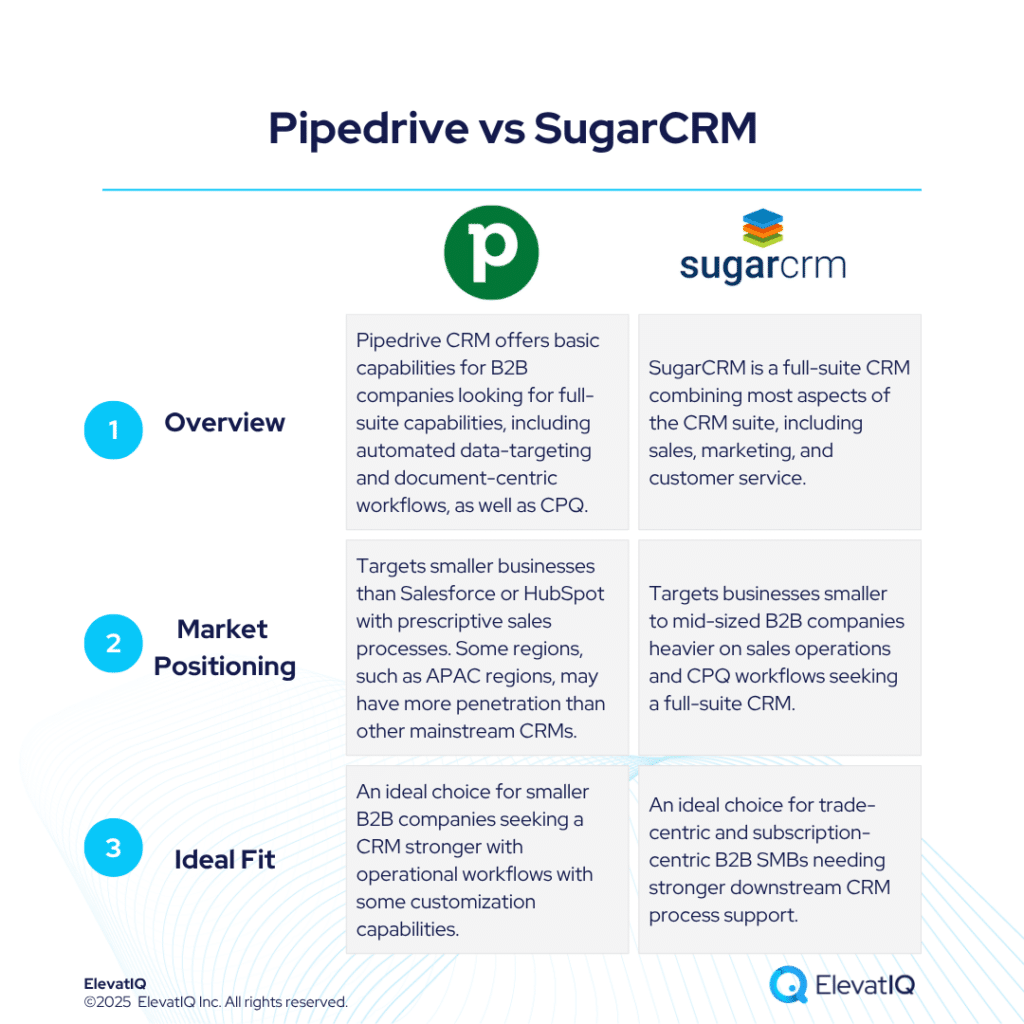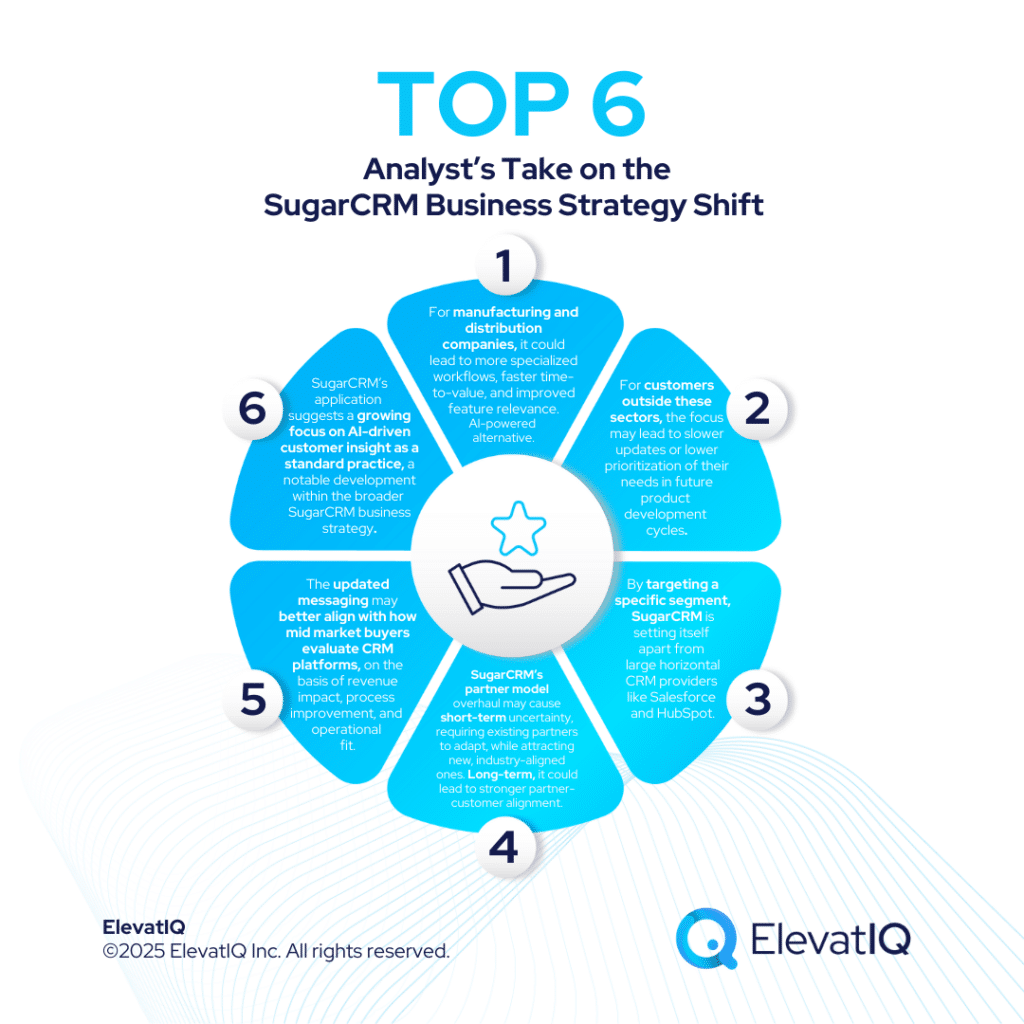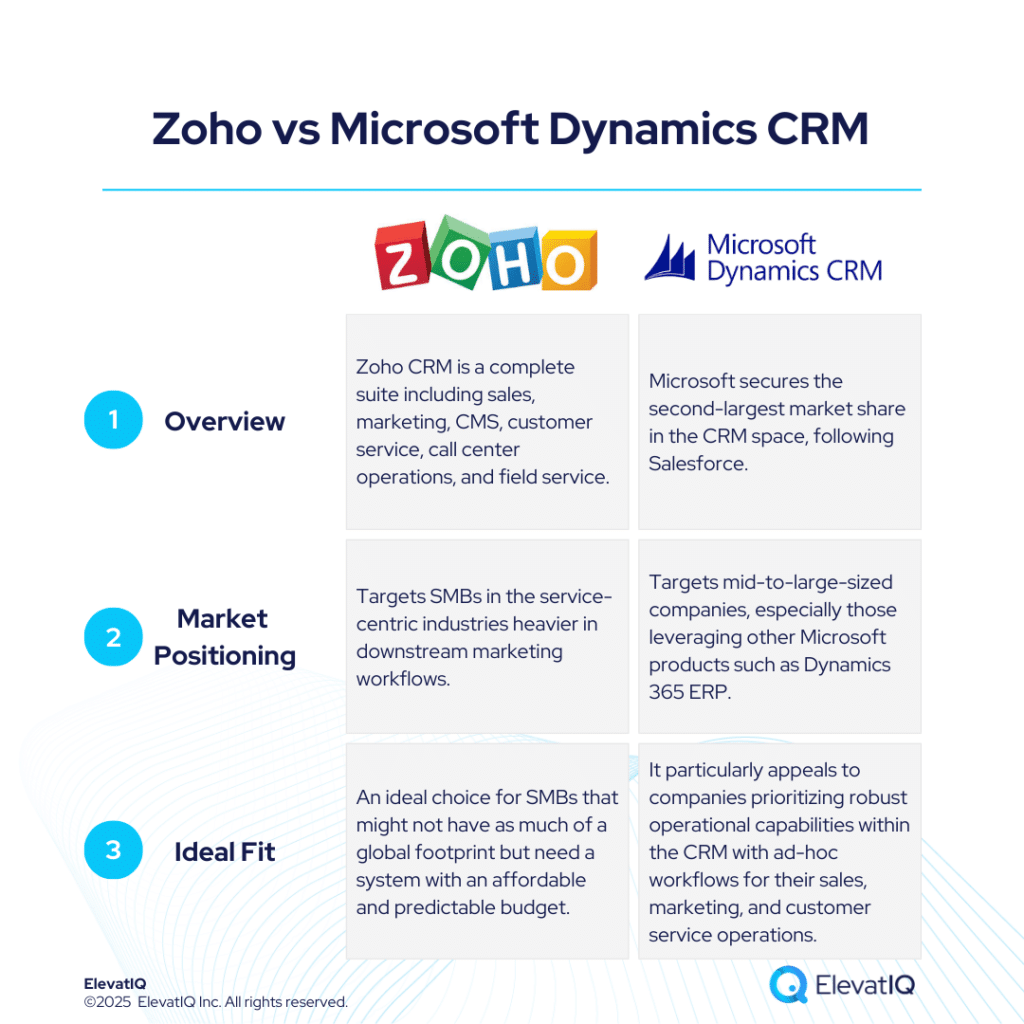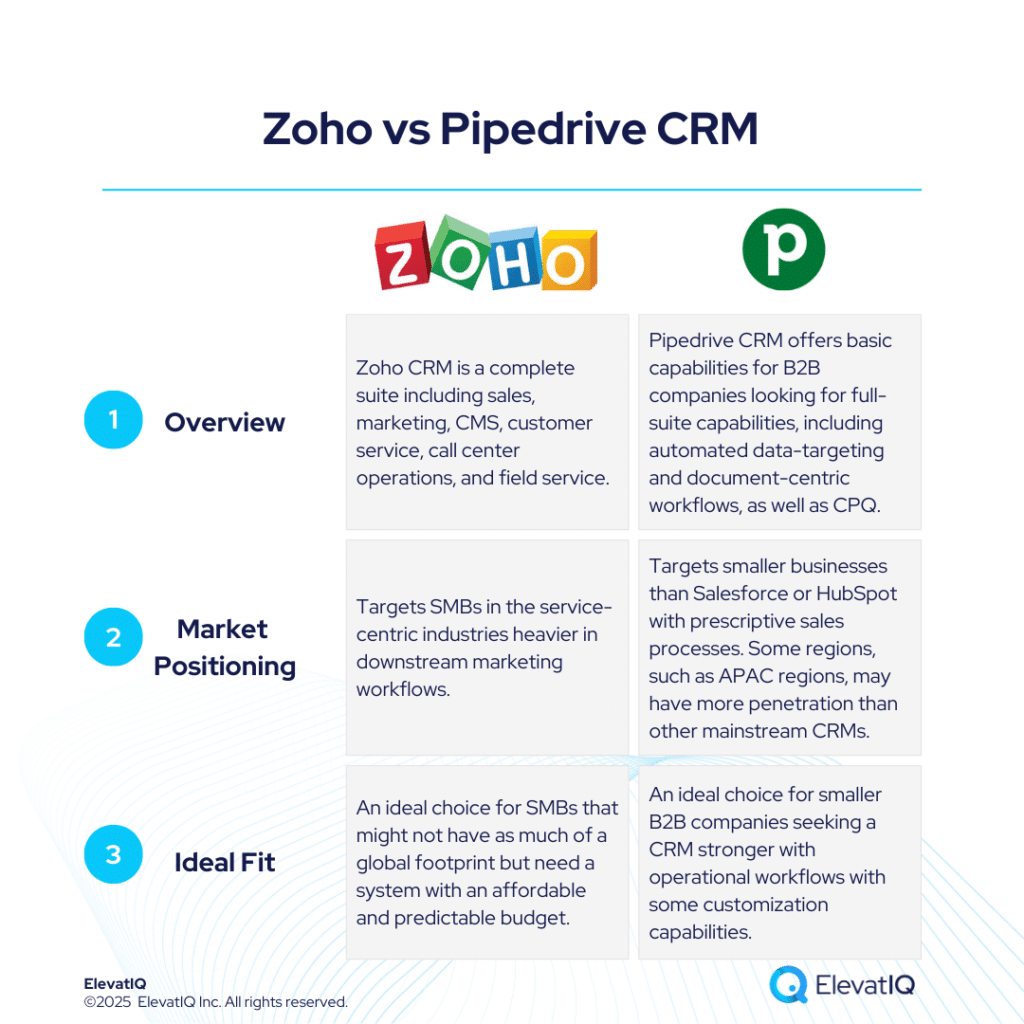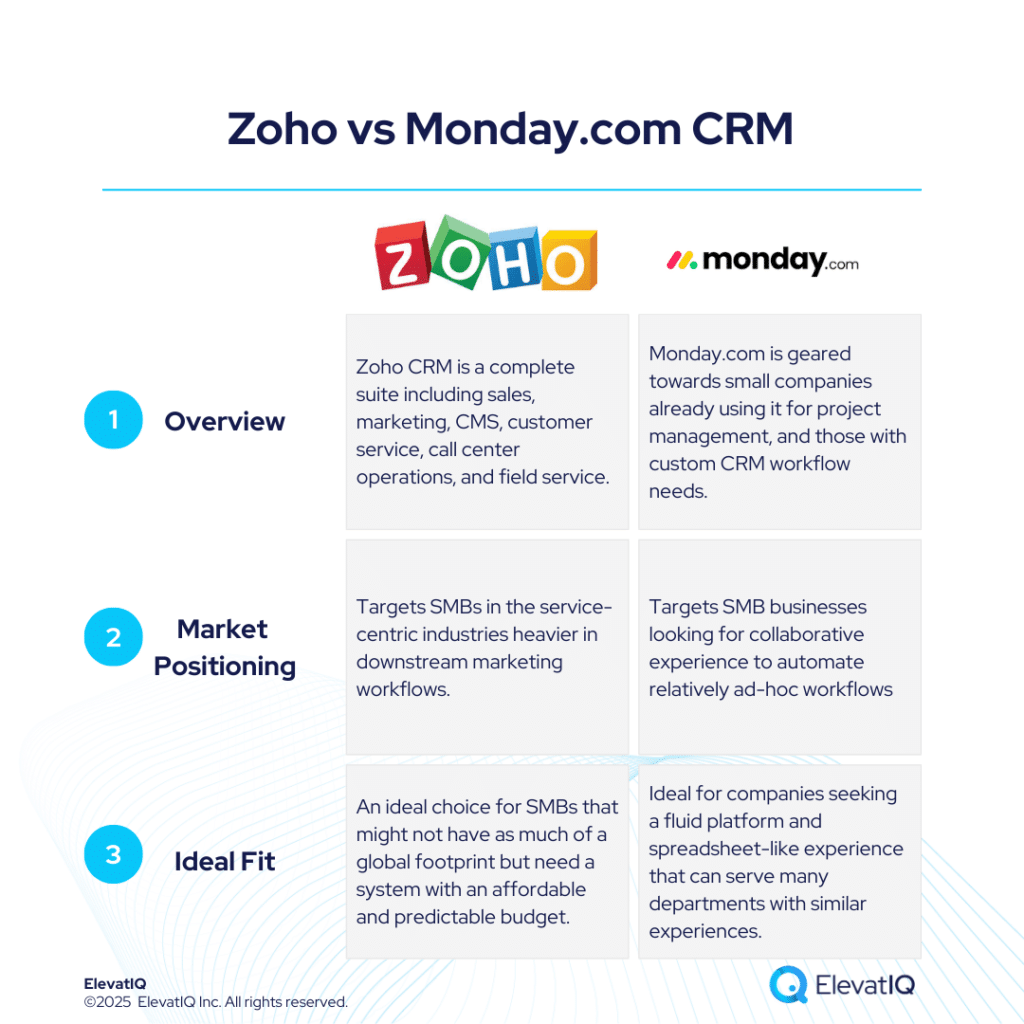Zoho CRM sees strong adoption among small to mid-sized marketing agencies, tech startups, and software development firms, though its presence in the enterprise market remains limited. It’s particularly well-suited for organizations already leveraging other Zoho applications like HCM or accounting, allowing for a more cohesive experience within the ecosystem. SugarCRM, on the other hand, is purpose-built for SMB industrial companies with complex sales operations and recurring revenue models. Its native CPQ tools and emphasis on data-driven workflows make it especially effective for businesses reliant on detailed product information during sales and estimation processes.
When it comes to integrations, Zoho’s ecosystem is relatively closed, with fewer third-party options compared to leaders like Salesforce or HubSpot—potentially limiting flexibility for companies with diverse application stacks. SugarCRM has improved in this area but still falls short of top-tier CRM ecosystems. Nevertheless, it offers strong value for industrial firms that benefit from pre-integrated ERP systems, helping reduce integration costs—an important factor for budget-conscious teams. Both platforms provide full-featured CRM suites covering sales, marketing, CPQ, project management, and customer service. Zoho’s suite, while expansive, can feel fragmented due to its modular architecture, whereas SugarCRM offers a more unified and tightly integrated user experience.
A notable edge for SugarCRM is the inclusion of subscription and project management tools natively within its platform. In terms of customization, Zoho provides more robust infrastructure for building advanced, scalable workflows, while SugarCRM supports lighter, low-code customizations via its built-in BPM engine. Despite its legacy origins, SugarCRM has evolved its user interface to meet modern standards, standing toe-to-toe with platforms like Zoho in terms of usability and design.

What Is Zoho CRM?
Zoho’s CRM ecosystem is designed with flexibility in mind, catering to both SMBs and enterprises through a tiered product lineup. Its Bigin solution is ideal for small businesses looking for a simple, affordable CRM with fast, DIY setup, while its flagship CRM has matured to address the needs of mid-market and even some large enterprises. This evolution is part of Zoho’s broader strategy—mirroring Microsoft’s—in which it offers a comprehensive suite of native apps spanning sales, marketing, service, finance, and operations. These tools can reduce reliance on third-party platforms, helping businesses keep their tech stack consolidated. However, this comes at a cost: many of Zoho’s applications, while functionally rich, operate in silos, requiring extra effort to unify data and workflows. Furthermore, the limited availability of native third-party integrations can pose challenges for companies pursuing a best-of-breed architecture.
Still, Zoho makes a compelling case for businesses with budget constraints or those seeking to build a full tech stack without heavy reliance on external tools. Its platform includes low-code app development, custom workflows, and even enterprise-grade capabilities like ITSM and business intelligence. But how does this modular yet somewhat insular architecture compare to more open, deeply customizable platforms like Pipedrive or Salesforce? Is the ease of implementation and cost efficiency worth potential trade-offs in flexibility and integration depth? To better understand how Zoho stacks up against Pipedrive across all key dimensions—sales, marketing, support, pricing, and customization—download the ultimate Zoho vs SugarCRM comparison guide now and make an informed CRM decision.
What Is SugarCRM?
SugarCRM has come a long way from its open-source roots, evolving into a focused solution tailored primarily for industrial and manufacturing businesses. Its user interface has modernized to rival platforms like HubSpot and Pipedrive, but what truly sets SugarCRM apart is its deep integration with ERP systems such as Epicor, SYSPRO, and Plex. Unlike broader platforms like Zoho—which may offer CPQ and workflow features but can struggle with data-heavy or industry-specific use cases—SugarCRM is engineered to handle complex manufacturing data structures. This makes it particularly well-suited for distribution-heavy companies with long product lifecycles or layered pricing models. However, businesses outside these core industries or those with complex, multi-vertical operations might find SugarCRM’s specialized focus a limiting factor.
Despite lacking Zoho’s breadth in custom app development or infrastructure flexibility, SugarCRM still supports configurable workflows through its built-in BPM engine and low-/no-code tools. It also includes project management, subscription billing, and case management modules—capabilities that align closely with the needs of B2B companies managing extended sales processes. But how do these features compare in depth and flexibility with what Zoho offers? Can SugarCRM’s industrial strength outweigh Zoho’s expansive suite for your business needs? To make a confident and informed decision, download the ultimate Zoho vs SugarCRM comparison guide now and discover which platform aligns best with your unique use case.
Zoho vs SugarCRM Comparison
Choosing between Zoho and SugarCRM requires a careful evaluation of how each platform aligns with your business’s operational needs and long-term strategy. Zoho offers a wide suite of integrated tools with a data model reminiscent of Salesforce, but its custom objects and marketing automation features may not be as robust for large enterprises with complex compliance or regulatory requirements. On the other hand, SugarCRM excels in ERP-centric industrial verticals with built-in CPQ and subscription workflows, making it a strong contender for manufacturing and distribution-heavy businesses. However, its narrower integration ecosystem and less mature marketing features might limit broader adoption across diverse business models.
When it comes to operational capabilities and customizability, Zoho shines with its flexibility and pricing model that bundles multiple apps, making it appealing for SMBs seeking value. But will its closed ecosystem and challenges with extensive customization become bottlenecks as your business scales? Can SugarCRM’s industrial-strength architecture compensate for its limited integration options and community-based support model? If you’re weighing usability, scalability, and industry alignment, download the ultimate Zoho vs SugarCRM comparison guide now and make an informed decision that fits your business’s future.
Zoho vs SugarCRM Module Comparison
Both platforms come equipped with a wide array of features aimed at improving business efficiency and streamlining operations. In this comparison, we focus on the unique strengths and capabilities of Zoho and SugarCRM across several key areas, offering valuable insights to help businesses make well-informed CRM decisions. Specifically, this section explores their functionality across core modules, including marketing, sales, customer service, and e-commerce.
Marketing
Zoho CRM offers several built-in tools to support content creation, including Zoho Writer, PageSense, Sites, Show, and Docs, though it lacks a dedicated content creation module like HubSpot. On the other hand, SugarCRM provides tools to create and manage content such as email campaigns and landing pages, though it lacks a robust SEO toolset for optimizing website content and search engine rankings. Zoho’s integrated social media management platform, Zoho Social, stands out by enabling businesses to create, share, and monitor content across major social media platforms, while SugarCRM relies on integrations with third-party services for social media management.
How do these differences impact your business needs when it comes to content creation, SEO, and social media management? Do you require a more seamless, all-in-one solution, or are third-party integrations sufficient for your marketing operations? If you’re trying to determine the best CRM for your marketing goals, download the ultimate Zoho vs SugarCRM comparison guide now to see a detailed breakdown of their features and capabilities.
Sales
Zoho CRM provides businesses with robust tools for lead management, offering features that capture, nurture, and convert leads effectively. It also provides a visual representation of the sales pipeline, helping teams track deals through various stages while offering insights into email performance with pre-designed templates. Additionally, Zoho CRM seamlessly integrates meeting scheduling with reminders and offers built-in collaboration tools to enhance real-time communication among teams.
SugarCRM also offers strong lead management tools, allowing businesses to capture, track, and nurture leads across the sales process. While SugarCRM similarly provides pipeline management features, it stands out with its ability to visualize and track deals, set milestones, and forecast revenue. However, in terms of collaboration, SugarCRM offers tools that enable smooth teamwork and communication within the organization, but may not provide the same level of integration as Zoho. Do you need more granular tracking and forecasting for your sales pipeline, or are simple management and collaboration tools sufficient for your team? To better understand how each CRM can serve your sales needs, download the ultimate Zoho vs SugarCRM comparison guide now!
Customer Service
Zoho CRM offers a comprehensive ticketing system that efficiently manages ticket creation, tracking, and SLA management. With integrated solutions like Zoho Desk and Zoho SalesIQ, it also enables real-time communication with customers, ensuring prompt resolution of customer issues. Additionally, Zoho CRM streamlines customer support processes through automation features, such as predefined response templates, automated workflows, and escalation rules. Its omni-channel support allows businesses to manage interactions across various channels, enhancing the overall customer service experience.
On the other hand, SugarCRM also provides a solid ticketing system, helping businesses create, track, and resolve support tickets effectively. While it offers live chat functionality for real-time customer support, its automation tools help streamline repetitive tasks, making the process more efficient. Like Zoho, SugarCRM supports omni-channel customer interactions across various platforms, including voice, email, chat, and self-service portals. However, do you require a more integrated or advanced customer service solution for your team? How important is omnichannel support for your organization? To make the best decision, download the ultimate Zoho vs SugarCRM comparison guide now!
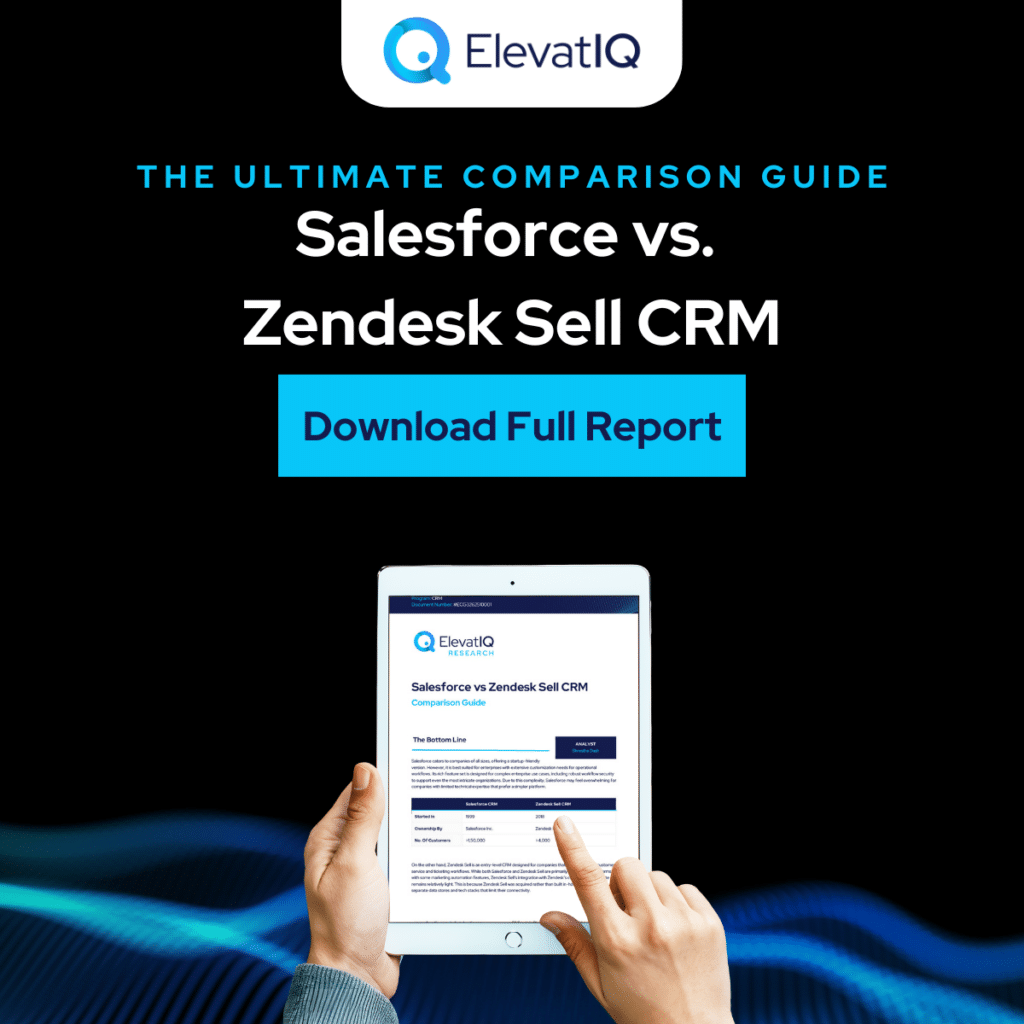
E-commerce
Zoho CRM allows you to create and manage a digital product catalog, helping businesses define and organize their product offerings effectively. Its integration with Zoho Inventory also aids in managing inventory, warehouse operations, and order processing, making it a comprehensive solution for e-commerce businesses. Furthermore, Zoho CRM provides the ability to offer personalized shopping experiences by integrating with other Zoho applications, allowing businesses to tailor experiences to individual customer needs.
On the other hand, SugarCRM also supports product catalog management, helping businesses define and categorize their products. It integrates well with e-commerce platforms like Shopify to streamline order fulfillment processes. While it offers personalization capabilities, SugarCRM leverages generative AI to create more customized shopping experiences for customers. But, does your business need a more seamless integration with e-commerce tools? How important are personalized shopping experiences for your business growth? Download the ultimate Zoho vs SugarCRM comparison guide now to make an informed decision!
Zoho vs SugarCRM Pros
When comparing Zoho CRM and SugarCRM, each platform brings unique advantages, making them attractive to different business needs. Zoho CRM shines with its pre-packaged workflow builder, allowing teams with development expertise to design complex workflows without much hassle. Its integration with Zoho Creator further enables developers to create custom applications quickly and efficiently, reducing reliance on third-party tools. Zoho CRM is also highly adaptable, making it a great choice for businesses looking for scalability and flexibility, especially when paired with Zoho’s broad suite of apps. On the other hand, SugarCRM offers a community edition that can be hosted on-premises, which is ideal for businesses that have existing server infrastructure and prefer to manage their CRM in-house. It also provides powerful capabilities for sales compensation and territory planning, making it a strong option for organizations in need of detailed sales processes.
What might make your business lean toward Zoho CRM—its ease of integration, wide application suite, or development capabilities? Or would you prefer SugarCRM for its cost-effectiveness and ERP alignment? How important is it for you to have the ability to host your CRM on-premises? Download the ultimate Zoho vs SugarCRM comparison guide now to find out which solution fits your business best!
Zoho vs SugarCRM Cons
Zoho CRM lacks robust support for territory management and sales team planning, which may be a significant drawback for larger sales teams. Additionally, the platform has limited integration options outside of the Zoho ecosystem, making it harder for businesses with diverse tech stacks to adopt Zoho without additional customization. Furthermore, Zoho’s ecosystem is slightly more closed compared to competitors like HubSpot, potentially limiting flexibility for businesses that need a broader array of integrations. On the other hand, SugarCRM’s interface may feel outdated, which could hinder user adoption, especially among teams used to modern platforms. While SugarCRM’s community edition is cost-effective, it requires organizations to handle hosting, upgrades, patches, and security, adding additional responsibility and potentially hidden costs.
Do these limitations affect your decision-making process? Is a modern interface or a broader ecosystem crucial to your business needs? How important is seamless integration with other systems for your team? Download the ultimate Zoho vs SugarCRM comparison guide now to explore which CRM solution is the best fit for your specific needs!
Download the Full Research Report
